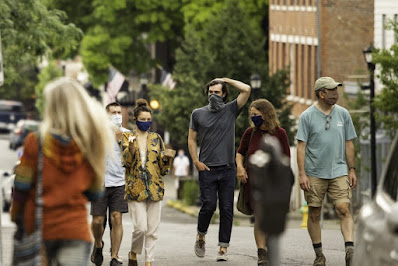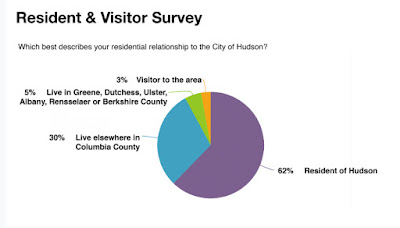Last Monday, Peter Spear presented the results of the Shared Streets surveys conducted at the end of last year--one for Residents & Visitors, one for Businesses--at a special meeting of the Tourism Board. The entire report can be viewed here.
 |
| Photo: JD Urban|Hudson Hall |
When asked how the Shared Streets program affected their visits to Warren Street for shopping or dining during a pandemic, 67 percent of the respondents said they visited Warren Street much more often or somewhat more often, and 19 percent said it didn't impact them one way or the other.
When asked if Shared Streets was overall a positive experience or an inconvenience, 61 percent indicated that it was a positive experience.
When asked if Shared Streets should continue this summer if COVID-19 remains a health issue, 61 percent said Yes. When asked if Shared Streets should continue on a seasonal basis even when COVID-19 is no longer an issue, 95 percent of the people who responded to the question said Yes.
When Spear had finished presenting the generally favorable review of the Shared Streets program, Alderman Jane Trombley (First Ward) declared, "The Council needs to take a leadership role for Shared Streets II." Allyson Strafella, however, who served on the Shared Streets Advisory Committee, said the surveys seemed biased and asked how people were informed about them. Spear told her they had "pushed out the survey through every channel we had." When Kate Treacy, who serves on the Tourism Board, asked about "her thinking around the bias," Strafella spoke of a "privileged population of people" and suggested the survey was "geared toward a certain class." She added, "I don't think Hudson needs a lot more PR."
Addressing the notion that the survey results were biased, Tamar Adler, also a member of the Tourism Board, said she thought a 17 percent response was "an accurate representation of those who didn't like [Shared Streets]." She told Strafella, "Opinions being considered is different from people being in the majority," and concluded, "Something not favoring one's own position doesn't represent bias."
Sidney Long, a former member of the Tourism Board, complained there was no accountability, asserting that Shared Streets created a very dangerous situation and there was no central authority. Marianne Courville, a member of the Advisory Committee, later spoke of concerns the committee had about safety that no one had addressed.
Marc Scrivo, who organized students from Operation Unite to build planter barriers, reminded the group that the project had come from an emergency and said he took offense at the comment about privilege. "My goal was to get kids involved. It wasn't about privilege. It was about getting kids involved."
Courville implicitly questioned the reliability of the survey by alleging that the survey accepted more than one response from a single person. George Wachtel, who designed the online survey, explained the survey had been set up to accept only one response from a computer.
Toward the end of the discussion, Scrivo echoed essentially what Trombley had said at the beginning: "It's really important that the City take a stand [on Shared Streets]." But the last word came from Selha Graham, who is a member of the Tourism Board. She spoke of exclusivity and privilege and life experience "when you live in an inner city like Hudson."
COPYRIGHT 2021 CAROLE OSTERINK
COPYRIGHT 2021 CAROLE OSTERINK







Now the City of Hudson needs a plan to provide additional parking and safe street crossings for visitors to our City and residents as well.
ReplyDeleteOpen Streets was a flawed but noble and moderately effective attempt by some residents to help local businesses in a time of need. It also provided a valuable look at possible ways we might reorient ourselves away from automobiles to be a more pedestrian-friendly community. Mr. Spears, Mr. Scrivo, and the team at Hudson Hall should be commended for putting in the effort to help out our local small business community and the workers who rely on tourism dollard.
ReplyDeleteIt seems to be the lazy tactic du jour for people to complain about data collection in an effort to devalue any data presented. If you want better data, be part of the solution.
I do hope some version of Open Streets continues in the future, though this iteration of the Tourism Board should be kept as far away from it as possible. The stated purpose of their committee is to promote Hudson as a tourist destination, and the only consistent efforts they seem to make are ponying up to the pork barrel buffet for themselves and sprinkling their fleecing of the city with some vague progressive-sounding virtue signaling to ward off any criticism. The list of projects they have approved and the oversight they have provided have been an embarrassment.
You do know that Shared Streets was a Tourism Board-funded project, right? And that this presentation was part of the oversight we requested in order to fund the project? And that it wouldn't have happened without this tourism board, and likely won't happen again without the tourism board?
ReplyDeleteShared Streets was funded by the Lodging Tax, paid for by short-term visitors to this town and collected by STR hosts, including hotels. The Tourism Board approved the expenditure to go to the Common Council. This is not a matter of semantics- your statement implies this is somehow the Tourism Board's money to do with as it pleases. It is not, and the purpose of the Tourism Board is to make Hudson a better destination for visitors, a mandate that seems to have been forgotten as the Board has been burning through the community's money on pet projects.
DeleteRubber-stamping someone else's hard work and then stepping in front of it to crown yourself with a wreath of laurels is not work, Tamar- it's masturbation. And I suspect if the money had gone into the general fund the Common Council would have been just as likely to approve the project, as cities all over the country did similarly. Given the amount of revenue the Tourism Board has otherwise failed to bring in, it probably would have happened more efficiently without your interference.
But since you're so fond of questions-I have a few for you. What is the occupancy rate of hotels and STRs mid-week and off-season? What has been the change in seasonal occupancy and room rate year-over-year? How much additional sales tax revenue would we realize with a 15% increase in traffic from NYC on weekends? (How much will it increase if they grocery shop instead of eating out? Trick question-grocery purchases aren't taxed, while restaurant purchases pay both a sales tax and a gratuity directly to the local worker!) How many FTE equivalents would be created if mid-week business in Hudson was such that restaurants were incentivized to open one more day per week year-round? Can we create bicycle infrastructure that allows weekend visitors to come on the train instead of cars and still enjoy all Hudson has to offer? Could Hudson residents also avail themselves of these amenities?
"I don't think Hudson needs a lot more PR." I’m confused, is the Tourism Board pro or anti tourism?
ReplyDeleteJust to be clear . . . the woman who made that statement is not on the Tourism Board.
DeleteIs tourism defined as spending City tax dollars on your friends and family during an economic crisis? Because then yes, they are pro-tourism.
DeleteThis comment has been removed by a blog administrator.
ReplyDeleteI have a business on Warren St. and consider the Shared Streets program a huge success. It doesn't impact me directly, but is effective in slowing down vehicle traffic and creating a more sociable vibe.
ReplyDeleteThis comment has been removed by a blog administrator.
ReplyDeleteThis comment has been removed by a blog administrator.
DeleteThis comment has been removed by a blog administrator.
ReplyDeleteIt might be worthwhile to also look at the business reviews since this was ostensibly “business aid”, and note that the majority of businesses did not participate, and ask why.....
ReplyDelete